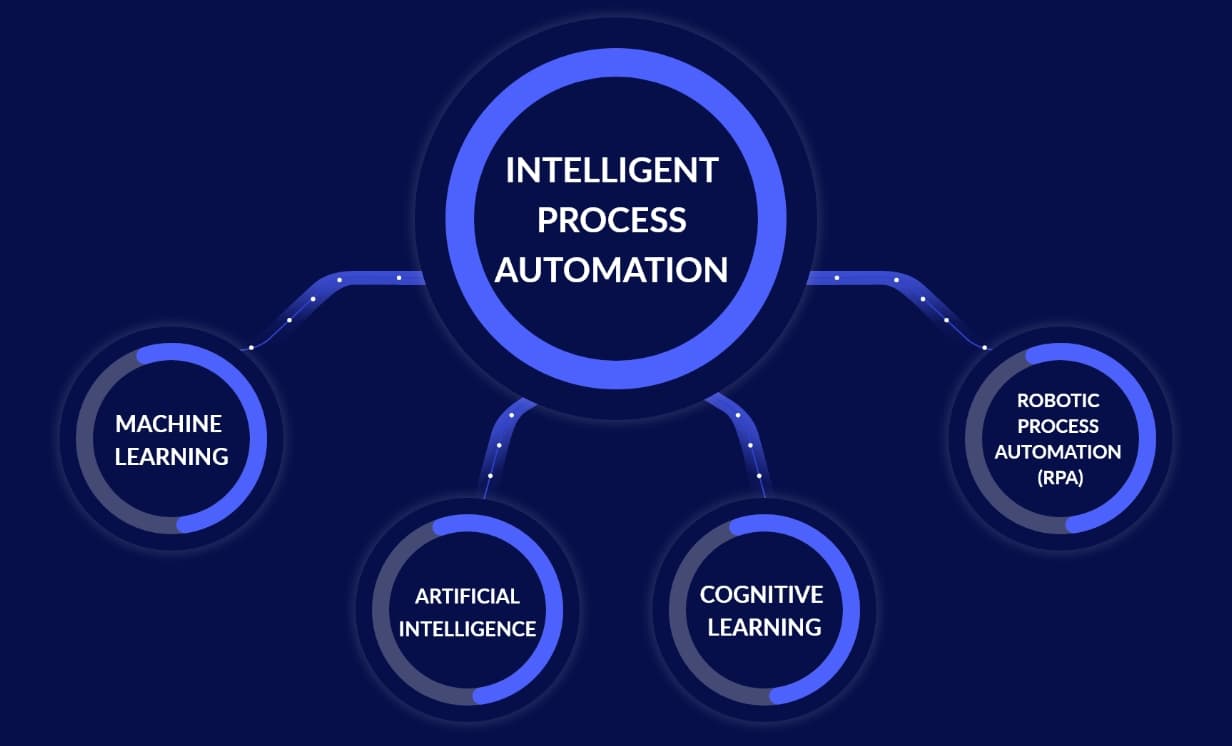One of the most promising and transformative technological advancements in recent years is Intelligent Process Automation (IPA).
By integrating intelligent automation into operational procedures, organizations can foster greater synergy between humans and technology, ultimately fostering an environment conducive to groundbreaking and revolutionary tasks.
What You Should Understand About Intelligent Process Automation (IPA)?

Reenbit provides intelligent automation services capable of enhancing business performance.
What is Intelligent Process Automation?
Intelligent Process Automation (IPA) is an advanced technology that combines artificial intelligence (AI) and machine learning (ML) with traditional process automation capabilities.
It goes beyond repetitive task execution by enabling systems to comprehend, analyze, and make decisions based on contextual information.
This fusion of AI and automation empowers organizations to optimize their operations, increase efficiency, and deliver exceptional customer experiences.
Components of Intelligent Process Automation Technology
- Robotic Process Automation (RPA): RPA forms the foundation of IPA. It involves using software bots or robots to carry out repetitive and rule-based tasks, freeing human workers to focus on more strategic and creative endeavors. These bots can work 24/7, ensuring continuous operations and improved efficiency.
- Artificial Intelligence (AI): AI technologies such as natural language processing (NLP), computer vision, and machine learning are integrated into IPA to enable systems to understand and interpret unstructured data, make informed decisions, and even learn from experiences to enhance performance over time.
- Machine Learning (ML): ML algorithms enable systems to recognize patterns, make predictions, and adapt to changes based on new data. This capability is particularly valuable when processes are subject to variations and require continuous improvement.
- Cognitive Automation: Cognitive automation combines AI, ML, and human-like reasoning to handle more complex tasks that involve decision-making and problem-solving. This facet of IPA empowers systems to interact intelligently with users and external data sources.
Distinguishing Intelligent Process Automation from Robotic Process Automation
In automation, two prominent terms often arise Intelligent Process Automation (IPA) and Robotic Process Automation (RPA). While they both pertain to streamlining business processes, they have distinct characteristics that set them apart.
RPA primarily focuses on automating rule-based tasks and processes, while IPA extends this capability with cognitive and AI capabilities. IPA systems can handle more complex processes that involve decision-making, data analysis, and learning from data.
Advantages of Intelligent Process Automation
The advantages of IPA automation are vast and impactful:
- Enhanced Efficiency: IPA streamlines processes, reducing the need for manual intervention and minimizing errors, leading to increased operational efficiency.
- Improved Customer Experience: With faster and more accurate processes, customer interactions become smoother, resulting in higher satisfaction.
- Data-Driven Insights: IPA systems analyze vast amounts of data to provide actionable insights, aiding in strategic decision-making.
- Cost Savings: Organizations can cut costs and allocate resources more effectively by automating repetitive tasks.
- Agility and Adaptability: IPA’s ability to learn and evolve ensures that businesses adapt quickly to changing market dynamics.
What are Some Use Cases for Intelligent Process Automation?
Intelligent Process Automation finds applications across various industries. Here are some examples of intelligent process automation transforming initiatives and workflows.
-
Healthcare
IPA can assist in medical data entry, claims processing, appointment scheduling, and patient record management in healthcare. Enabling healthcare professionals to emphasize patient care and concurrently decreasing administrative tasks.
-
Insurance Industry
IPA streamlines insurance claim processing by automating data extraction, verification, and settlement. Accelerating the claim resolution process enhances customer satisfaction.
-
Financial Services
In the financial industry, IPA can automate compliance checks, fraud detection, customer onboarding, and mortgage processing. This leads to quicker transactions and improved regulatory adherence.
Industries such as healthcare, insurance, and finance have all harnessed the power of IPA to streamline their operations, enhance customer experiences, and drive innovation.
By working with https://reenbit.com/, companies can identify areas for improvement, implement custom automation solutions, and achieve greater efficiency and profitability.
The Future of Automation: The Role of Intelligent Process Automation
As technology advances, the role of Intelligent Process Automation will become even more significant. With the fusion of AI and automation, businesses will achieve unprecedented operational efficiency and innovation.
The future holds the promise of even more complex automated processes, paving the way for organizations to focus on higher-value tasks and strategic endeavors.
More Related Guides:
- Enhancing Human Operators Through Automation
- The Role of Automation in ITSM Incident Monitoring
- How Can AI Automation Tools Improve Customer Experience
- Awesome Automation Tools
Conclusion:
In conclusion, Intelligent Process Automation is a game-changing technology that blends the power of AI with automation to drive efficiency, accuracy, and innovation across industries.
Reenbit’s intelligent automation services exemplify the potential of IPA in enhancing business performance and customer experiences. Embracing IPA is not just a trend but a strategic move towards a more agile and competitive future.
So, as industries evolve and businesses strive for excellence, Intelligent Process Automation stands as a beacon of progress, guiding organizations toward a brighter and more efficient tomorrow.



